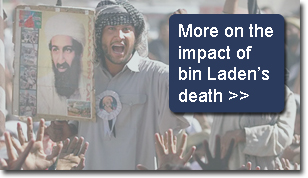Afghans Present Complex Reaction to the Death of Osama bin Laden
While the response to the death of Osama bin Laden in the United States was largely euphoric, in Afghanistan, arguably the country most impacted by bin Laden and al-Qaida, the response has been one of concern and caution. In order to parse this response, USIP reached out to a number of our Afghan partners and friends for their response to events of May 1.
May 11, 2011
While the response to the death of Osama bin Laden in the United States was largely euphoric, in Afghanistan, arguably the country most impacted by bin Laden and al-Qaida, the response has been one of concern and caution. In order to parse this response, USIP reached out to a number of our Afghan partners and friends for their response to events of May 1. Since the October 2001 launch of Operation Enduring Freedom, Afghanistan has been a focal point of the war on terror. The death of the war on terror’s main target is subsequently certain to have an impact on U.S. strategy in Afghanistan. Senior administration officials quoted by The Washington Post marked the death of bin Laden as “the beginning of the endgame of Afghanistan,” seeing it as an opportunity to energize reconciliation talks, or even for the Taliban to end its alliance with al-Qaida.
With the goals of that endgame still unclear, especially in terms of political redress and reconciliation, a number of Afghan officials have expressed concerns about the ‘mission accomplished’ attitude bin Laden’s death has engendered among segments of the U.S. government. One former Afghan cabinet member said, “the United States should continue its presence in the region until the total destruction of the sanctuaries, training camps and financial resource of the insurgency is achieved.” Echoing these sentiments, another Afghan prominent in national politics told USIP that “The United States and its partners need to stay on course in Afghanistan and elsewhere until the Taliban and al-Qaida are ‘dismantled’ and it…no longer [possesses] ability to organize and plan for terrorist attacks,” citing the reality that bin Laden’s death will not be the demise of the tactics he developed and employed.
Though those Afghans with whom USIP spoke shared their “relief and happiness” at the news of bin Laden’s death, numerous news outlets have conveyed a resigned indifference on the part of the Afghan public in light of Taliban vows of reprisals and the war’s ever-extending timeline USIP’s Afghanistan country director, Shahmahmood Miakhel, says that for many Afghans, bin Laden’s death, while welcome, “doesn't signify overall victory till there is…peace and stability in Afghanistan.” For one former Afghan cabinet official, the challenge of establishing peace and stability in Afghanistan remains as great as before bin Laden’s death as the sanctuary afforded to bin Laden and al-Qaida by the Taliban “has helped [terrorist groups] develop extremely complicated organizational and operational structures which will continue to survive for decades to come.” These concerns were expressed at a rally on May 5 in Kabul, at which tens of thousands of Afghans turned out to denounce al-Qaida and the Taliban. Amrullah Saleh, one of the rally speakers and former head of intelligence for the Afghan state, was quoted by The New York Times as criticizing moves towards reconciliation with the Taliban because, in his words, “they have destroyed our lands and houses, dishonored our wives and families,” and “are not our brothers.” The event’s anti-Taliban rhetoric suggested that anticipated openings for progress on national reconciliation after bin Laden’s death may not be welcomed by all Afghans.
The fact that bin Laden was discovered in Pakistan has also unsettled many Afghans who feel that the war’s focus on Afghanistan is increasingly misplaced with each al-Qaida leader discovered in Pakistan. Representative of this sentiment, President Hamid Karzai’s May 2 statement on bin Laden’s death concluded that “the war against terrorism is not the villages and homes of poor Afghans and the war should be taken to its hideouts, training sites not in the Afghan homeland.” While one Afghan official went so far as to suggest that the U.S. should now include Pakistan in its list of state sponsors of terror, USIP’s Moeed Yusuf has noted that the death of bin Laden in Pakistan “has probably embarrassed many within the strategic community in Pakistan,” and that there is “no interest for the Pakistani state to harbor any al-Qaida operative.” The effect that the death of bin Laden will have on reconciliation efforts, and the future of the war on terror overall, remains unclear as events continue to unfold. Hopefully the death of bin Laden will energize rather than mark the end of international efforts to create the space for a peace process to end the decades of conflict faced by Afghanistan and its neighbors.




